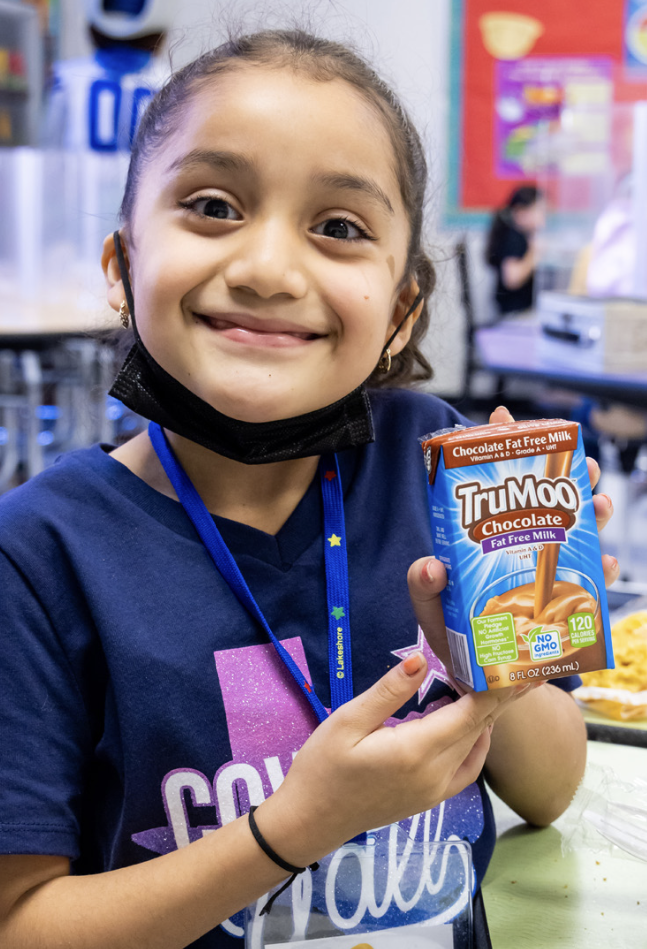Tetra Pak U.S. and Canada 2022 Sustainability Report: Food

Tetra Pak 2022 Sustainability Report
Piloting Shelf-Stable Milk in Schools
Milk is an important part of school meals — it can benefit students’ overall health and is packed with 13 essential nutrients, including protein, to combat hunger. Educators report that school meals can help students with lack of energy, poor academic performance and an inability to concentrate. As a result, schools purchase a significant amount of milk.
The Dallas (Texas) Independent School District (Dallas ISD) supplies its students with more than 1.5 million gallons (5.7 million liters) of milk each year. But the logistics of receiving and storing all that milk can be a challenge for schools, which typically have tight budgets and limited chilled storage capacity. At the beginning of 2022, Dallas ISD, Tetra Pak, Dairy Management Inc. (DMI) and DairyMAX launched a shelf-stable dairy milk pilot in the district.
What is shelf-stable milk?
- Shelf-stable milk is the same as refrigerated milk, packaged in an aseptic carton.
- To allow for a shelf life of more than six months with no refrigeration needed before opening, the milk also undergoes Ultra High Temperature (UHT) processing.
- UHT processing combined with an aseptic carton retains the nutritional value of the milk without the use of additives or preservatives.
The pilot with Dallas ISD took place over five months and looked at the impact of switching from chilled to shelf-stable milk in nine elementary schools. The results of the study show cost savings, fewer deliveries of milk and increased consumption:
- A projected savings of six cents ($0.06) per serving, specific to supply chain costs.
- Deliveries of milk were reduced from five times a week from the milk processor to twice a week by the district. Fewer deliveries resulted in a more than 50% reduction of truck miles for Dallas ISD.
- Milk consumption increased 6% and waste declined 5%.
Additionally, shelf-stable milk has a lower carbon footprint than its chilled counterpart because it does not rely on refrigerated distribution networks and storage, both of which demand electricity. Because shelf-stable milk does not need refrigeration before opening it has less risk of spoilage, making it convenient for schools in rural areas, as well as after-school and food backpack programs.
Two other school districts previously conducted similar pilots, and are continuing to use shelf-stable milk, four and six years later. These districts report they’ve been able to reduce the challenges associated with chilled milk, such as spoilage. One director said shelf-stable milk has made their operations easier and was a worthwhile change. Other school districts have expressed interest in conducting similar pilot studies in the 2022-2023 school year.
Educating the Industry on Best Practices for Sustainability
As part of our efforts to make sure food is produced as sustainably as possible, we’re working to share best practices and technology updates with the industry.
The International Society of Beverage Technologists hosted their annual BevTech event in North Texas in May 2022 and invited Tetra Pak to educate attendees on aseptic processing and packaging. Jordan Fengel, Tetra Pak U.S. and Canada Sustainability Manager, was featured on the main stage and spoke about how Tetra Pak is meeting today’s sustainability demands while looking toward the future. As part of the conference, attendees were invited to
Tetra Pak’s Denton, Texas, facility to learn more. Twenty BevTech attendees received a tour of the converting factory where our carton packaging material is produced, as well as the Product Development Center and Customer Innovation Center. This tour demonstrated many of Tetra Pak’s best-in-class operations and showcased our innovative processing and packaging equipment to professionals in the beverage industry.
Sasha Ilyukhin, Vice President Customer Service Operations - Americas, Tetra Pak, shared with Food Technology magazine how advances in technology such as connected sensors and data analytics can help food producers improve efficiency, quality and safety.
Ilyukhin also teamed up with Jason Pelz, Vice President of Sustainability, Tetra Pak U.S., Canada, Central America and the Caribbean, for an episode of the Future of Field Service podcast. They discussed the many opportunities for food and beverage manufacturers to increase sustainability and reduce waste through automation systems, predictive maintenance, Total Productive Maintenance (TPM) and more.
Another area where Tetra Pak can help its customers become more sustainable is through sustainable carton packaging. Seth Teply, President and CEO, Tetra Pak U.S. and Canada, was a guest on
the International Dairy Foods Association’s The Dairy Download podcast, where he shared the trends Tetra Pak is seeing in the demand for sustainable packaging, and how Tetra Pak is innovating to make its packages even more sustainable and renewable.
Fengel was also a guest on the Sustainable Packaging podcast where he shared Tetra Pak’s approach to packaging sustainability, including sustainable materials, recyclability, and the role of shelf-stable cartons in addressing food waste.
"Combined with the pressing environmental issues and human components, industries are now at the crossroads to contemplate the future of manufacturing within the upcoming fifth industrial paradigm, which promises the use of technology for more sustainable, resilient and equitable cyber-physical systems"
Sasha Ilyukhin, Vice President Customer Service Operations - Americas, Tetra Pak
Keeping Food Innovation Going
Tetra Pak’s Product Development Centers are where food innovation is brought to life. These unique facilities give our customers a place to test new recipes on a small scale. During the pandemic, the Product Development Center in Denton, Texas, knew food innovation needed to continue and created a solution for customers who were unable to travel to them. They began hosting virtual trials so customers could participate remotely. Not only did this allow food innovation to continue, but it also reduced carbon dioxide emissions by eliminating our customers’ need to travel. Even with travel increasing, about half of our customers are still choosing this virtual option, saving approximately 100 tons of CO2 emissions in the last year.

